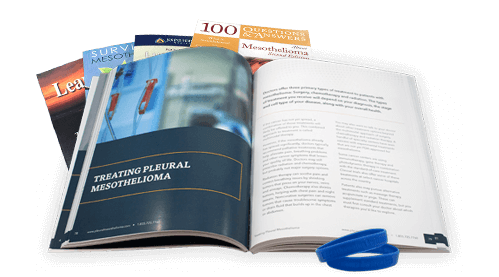Caregivers for Mesothelioma Patients
When someone you love is diagnosed with mesothelioma, it can rearrange your life and the roles and relationships in your family. Spouses and adult children often fulfill the primary caregiving role, while siblings, other relatives, friends and neighbors take on secondary caregiving roles.
What Is a Caregiver?
Mesothelioma caregivers help their loved ones with mesothelioma in many ways, from managing medical care to household chores to emotional support and companionship. Spouses, adult children and other relatives most commonly fill caregiver roles, but so can friends, neighbors and hired professionals.
These mesothelioma caregivers face unique responsibilities and challenges that other caregivers do not. Caring for someone with cancer is challenging, and it is especially difficult when there is no cure for the cancer. Mesothelioma is considered terminal, and this means that most mesothelioma caregivers take on more roles, duties and responsibilities as the cancer progresses.
This element of mesothelioma caregiving underscores the importance of creating a caregiving plan and relying on others for help.
As the cancer progresses, your family will need to plan for additional support. This support may come from friends, family, neighbors, community organizations or professional caregivers. While primary caregivers are often not paid for the role they serve, they can hire a paid caregiver for professional support and guidance.
Who Can Become a Caregiver?
Anyone can become a caregiver, and there are primary and secondary caregiving roles. Primary caregivers take on the bulk of the day-to-day caregiving duties, including medical care, grooming and bathing, cooking and household chores. Secondary caregivers may contribute to any of those roles, but they tend to do so less often than a primary caregiver.
Mesothelioma caregivers usually take on more duties and responsibilities than caregivers offering care to someone with a less serious illness.
- Spouses: The spouse of someone with mesothelioma often fills the primary caregiving role. Some spouses struggle to balance caring for their loved one with taking care of themselves. Reach out to family and friends regularly for support to help avoid burnout.
- Adult Children of Someone with Mesothelioma: Adult children may fill the primary caregiving role in families facing a mesothelioma diagnosis. It’s common for adult children to take on both primary and secondary caregiving roles if their parents are struggling physically or emotionally with all that comes with a mesothelioma diagnosis.
- Siblings
- Other relatives
- Friends
- Neighbors
What Does a Caregiver Do?
Like the way a parent cares for a child when they get a cold, caregivers take care of someone with an illness who cannot easily care for themselves on their own. In this regard, spouses and adult children of someone with mesothelioma may fall into roles with responsibilities they never expected to encounter.
Caregiver Duties
- Medical care
- Medication management
- Coordinating medical appointments and transportation
- Grocery shopping and meal preparation
- Bathing and grooming
- Household chores
- Companionship
- Financial management

Self-Care for Family Caregivers
A mesothelioma diagnosis changes the lives of the patient and primary caregiver immediately and significantly. Being diagnosed with terminal cancer makes the emotional toll heavier, and the changes in daily life happen suddenly.
While it is natural to pour all your energy and attention into your loved one, it is not selfish to take care of yourself, too. In fact, it is extremely important for family caregivers to carve out time to take care of their health and seek support.
Common Challenges Faced by Mesothelioma Caregivers
- Physical and mental stress
- Caregiver burnout
- Long-distance caregiving
- Family disputes over care
- Financial stress and strains
Should You Hire a Caregiver?
Deciding to hire a caregiver isn’t a simple decision for most families. Whether they have complex feelings about someone they don’t know caring for a loved one or don’t have the financial means to easily afford a professional caregiver, it can be hard for families to reach an agreement on this topic.
- Hiring a professional means primary and secondary caregivers will have more time to take care of themselves and other family members.
- Professional caregivers have experience overcoming common medical and familial hurdles that non-professionals don’t have. This may translate into a smoother and better caregiving experience for the patient and their loved ones.
- The stress relief that comes from knowing you have someone with extensive experience to guide you and offer excellent care to your loved one may bring some peace of mind.
- Finding a professional caregiver who you feel comfortable with may not be quick and easy. It’s OK to shop around and interview multiple caregivers to find the right fit for your family.
- Certain family members, including the patient, may not feel emotionally comfortable with someone outside the family circle caring for them or their loved one. This may be overcome by finding the right caregiver, but it is certainly a common concern.
- The cost of hiring a professional might not be affordable for many families. It is possible to hire a part-time caregiver or a home health aide to step in just a few hours or days a week.
Resources for Caregivers
Mesothelioma caregivers should remember that they are not alone. There are many resources available to those caring for a friend or family member.
- Cancer Center Resources: Your loved one’s cancer center might have a social worker and mental health therapist on staff to assist caregivers and families in many ways. They might even have someone to help you negotiate with your health insurance provider to lower costs of treatment and maximize coverage.
- Support Groups: Caregivers benefit greatly when they join a support group. It might not be easy to find a mesothelioma support group in your area, but they are available online. A general caregiver support group might be available through the cancer center or local organization or community center.
- Respite Care: Respite care gives caregivers a break, either in the privacy of their own home or at a respite care center. This gives caregivers much-needed relief and allows them to decompress and focus on themselves for a little while.
- Books and Online Resources: Some caregivers find strength and encouragement by reading books on caregiving or joining online forums or groups where caregivers share tips and resources.
- Caregiving Apps: Caregiving apps, such as CaringBridge and Lotsa Helping Hands, help family members coordinate care and share medical updates in one place.
Mesothelioma caregivers face situations and challenges that many other caregivers rarely encounter. Caring for someone you love with such a serious illness takes its toll emotionally and physically.
The importance of caring for yourself and gathering all the support you can find can’t be understated. Avoiding caregiver burnout is important to your health and will allow you to offer the best care possible to your loved one.



